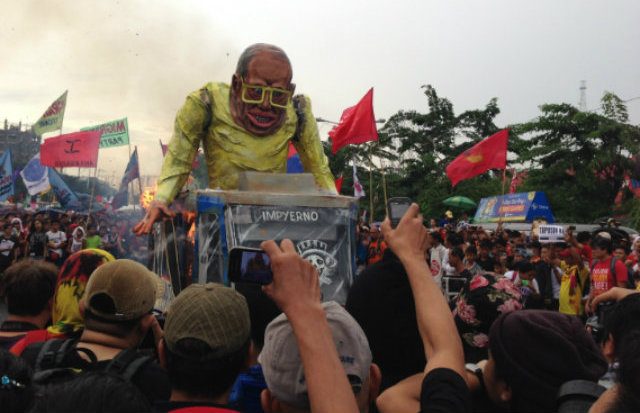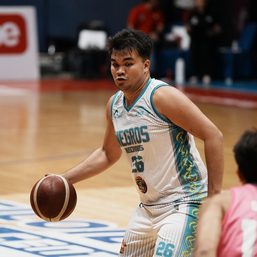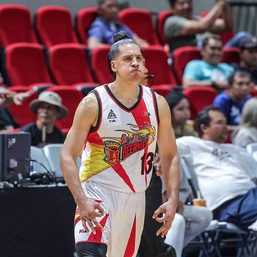SUMMARY
This is AI generated summarization, which may have errors. For context, always refer to the full article.

Attending the State of the Nation Address (SONA) was our first experience ever reporting on ground in the Philippines. Prior to the event, we did not understand much about Philippines’ political system here. Staying here in Manila and talking to many Filipino friends for the past two weeks, we found out that the Philippines and our country, Cambodia, are facing similar social issues like corruption, unemployment, migration, and inequality, just to name a few.
Before getting out on the field, our supervisor advised us to take the necessary precautions. It reminds us of our editor in Cambodia who gave the same advice. We got a sense that the same thing might happen – a violent clash because of protest rallies.
To get to the location, we made our way through Philcoa by MRT and jeepney. We got lost with the jeepney route for about 40 minutes on our way to Berkley Square, so we eventually decided to take a cab from there. As police forces blocked some roads, we decided to walk for another 300 meters.
Arriving at the rally, we rushed to get in the crowd. Various colorful banners with messages welcomed us. Though we couldn not understand Tagalog, a few banners written in English already gave us ideas on what they meant. We saw many jeepneys packed along the road with banners, and hundreds of people standing on the aisles watching the rally.
Among the crowd, we met Christian Anthony Ranque, 17. He’s been a high school dropout since his single mother could not afford his tuition fees. He is among the hundreds of young people in the rally expressing their concerns on various issues. Christian is worried about the future of poor young Filipinos who do not have access to education because of high tuition fees.
“I want the next leader to give the budget not only to the military but also to the education sector” he says, “the youth is the hope of the nation once we receive better education.”
At a glance, we were impressed with his strong commitment fighting for his rights. Observing the scene, we could see the protestors’ solidarity and braveness in making their voices heard and urging the president to accomplish what he promised during the campaign period. We see them appearing as well-managed protests groups.
Similar issues in Cambodia
Another case was the controversial land concession issue. The Cambodian government granted land concessions to foreign investors while hundreds are residing without any proper land titles and are being demolished. The issue dragged on for years as the residents did not accept the compensation and the government continued the investment project.

Freedom of expression in the Philippines is stronger than in our country. In Cambodia, aside from holding protest banners, we have not seen any act of burning the effigy of the leaders yet. If they dare, they will be in trouble with police forces. Nevertheless, security during the SONA protest rally in the Philippine is well-planned and executed. Compared to Cambodia, it is less likely to result in violent clashes.
We are inspired when young Filipinos like Christian demand that his government prioritize education. In Cambodia, we used to feel hopeless in our education situation because back then our government would not lift a finger to improve it.
However, our current minister of education, Hang Chuon Naron, who was appointed in 2013, has given hopes with his reforms, policies, and commitments and now almost everyone sees the positive changes happening in this sector in our country.
The Philippines and Cambodia governments tend to have the similar take on education. While Cambodia spends about 16.20% of its national budget for the education sector, the Philippines spend 18.6% on education. However, the similarities end there. In the Philipppines, critics complain that the government tends to leave education in the hands of the private sector, increasing the education gap. This results in only the children coming from rich families finding find well-compensated jobs after graduation.
In Cambodia, we seem to have accepted this reality. We are resigned to the fact that our government cannot do much without help from the private sector who are heavily involved in higher education.
After the SONA protest rallies coverage that we were assigned to do, we realized that we see a lot of problems that we alone cannot solve in a day or a year. It takes years or decades. As youths of the ASEAN region, we encourage everyone to speak out for a change. Let’s not only wait for change; but be the changemakers ourselves.
In both Cambodia and Philippines, we are optimistic about the future, yet every single youth just needs to do more to make our collective future brighter. – Rappler.com
Monyneath Reth and Sokummono Khan are Rappler Interns from the Royal University of Phnom Penh in Cambodia.
Add a comment
How does this make you feel?





There are no comments yet. Add your comment to start the conversation.